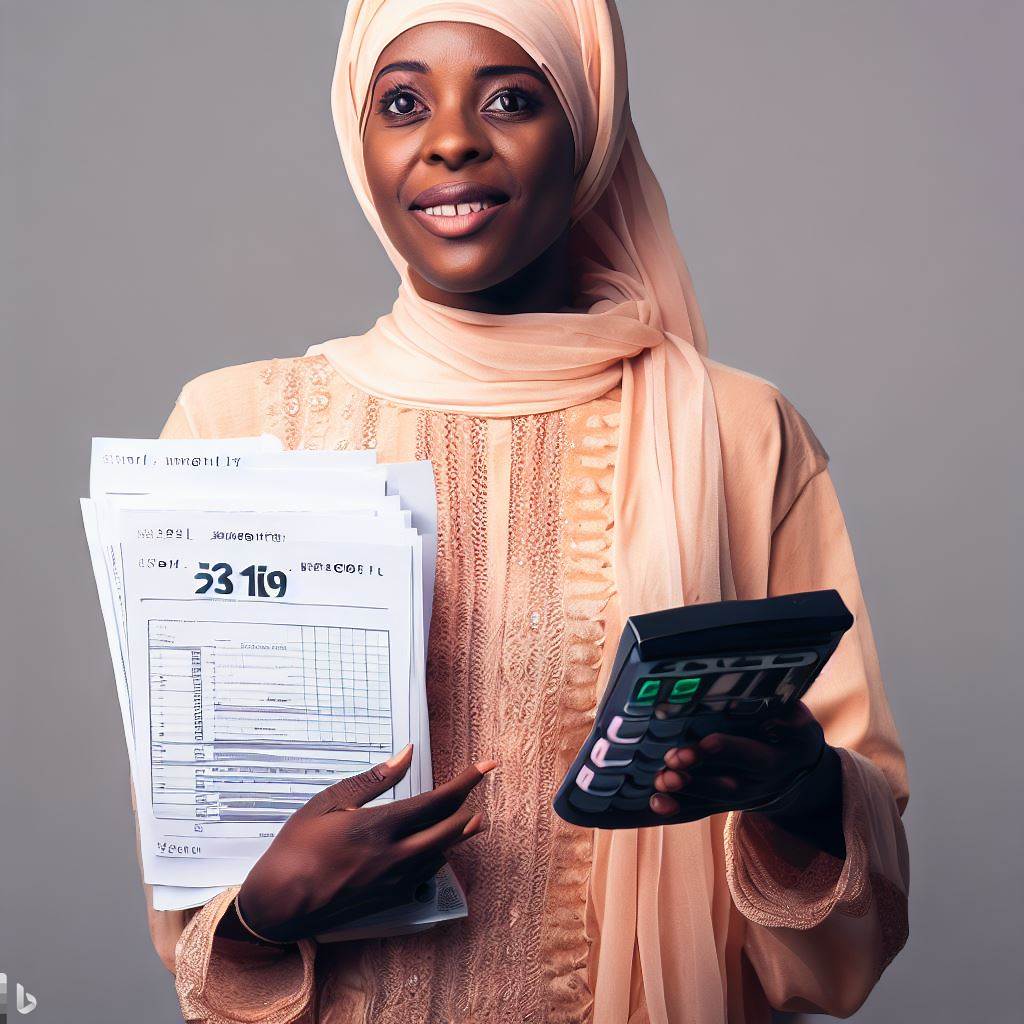Introduction
Understanding Financial Literacy
Financial literacy entails grasping financial concepts like budgeting, investing, and debt management.
Significance for Individuals and Economies
- Empowerment: Equips individuals with skills to make informed financial decisions, enhancing their well-being.
- Economic Growth: Enhances national economic stability and growth by fostering responsible financial behavior.
Nigeria’s Economic Context and Imperative for Financial Literacy
- Diverse Economy: Nigeria’s economy spans sectors like oil, agriculture, and services, necessitating diverse financial knowledge.
- Financial Challenges: High poverty rates and income inequality underscore the urgency of financial literacy.
- Youth Demographic: Nigeria’s youthful population can harness financial literacy for a brighter economic future.
In the upcoming sections, we will delve deeper into Nigeria’s financial landscape, exploring challenges, opportunities, and strategies for promoting financial literacy.
The Current State of Financial Literacy in Nigeria
A. Overview of Financial Literacy Levels
Financial literacy in Nigeria remains alarmingly low, hindering economic growth and individual prosperity.
- A mere 26% of adults understand basic financial concepts, impeding effective financial decision-making.
- Complex financial products and services are often misunderstood due to inadequate knowledge dissemination.
B. Factors Contributing to Low Financial Literacy
Multiple factors converge to perpetuate the low financial literacy levels in Nigeria.
- Education System: Financial education lacks integration within the formal education curriculum.
- Limited Access: Many rural areas lack access to financial institutions, impeding learning and practice.
- Cultural Norms: Traditional beliefs can discourage engagement with modern financial practices.
- Language Barrier: Complex financial jargon presented in English alienates non-English speakers.
C. Impact of Low Financial Literacy
The repercussions of low financial literacy reverberate throughout individuals and the nation’s economy.
1. Individuals
- Inability to budget and save for future goals.
- Vulnerability to scams and predatory financial products.
- Reduced entrepreneurship due to limited understanding of investment mechanisms.
2. Nigeria’s Economy
- Limited Capital Formation: Insufficient savings hinder the country’s capital accumulation.
- Low Investment: With limited understanding, citizens shy away from the formal financial system.
- Stunted Economic Growth: The economy faces sluggish growth due to underutilization of resources.
Addressing the Issues
Addressing this issue requires a concerted effort from various stakeholders:
1. Government
- Integrate financial literacy into the national education curriculum.
- Develop localized and simplified financial education materials.
2. Financial Institutions
- Offer accessible workshops and seminars on financial management.
- Provide clear, jargon-free information about their products and services.
3. NGOs and Community Organizations
- Host awareness campaigns in local languages.
- Educate citizens about basic financial concepts through interactive sessions.
4. Media
- Promote financial literacy through television, radio, and online platforms.
- Translate complex financial terms into relatable content.
To summarize, Nigeria’s current state of financial literacy is a critical challenge that demands urgent attention.
Elevating financial literacy levels will empower individuals to make informed decisions and positively impact the nation’s economy.
By addressing the factors that contribute to low financial literacy and implementing comprehensive educational initiatives, Nigeria can pave the way for a more prosperous future.
Read: From Naira to Dollars: Currency Literacy for Nigerians
Initiatives to Promote Financial Literacy in Nigeria
A. Government efforts and policies
- The Nigerian government has recognized the importance of financial literacy in the country’s economy.
- They have implemented various initiatives and policies aimed at promoting financial literacy among the population.
- One of the key initiatives is the National Financial Inclusion Strategy, which aims to improve access to financial services and enhance financial literacy.
- The government has also introduced financial education programs in schools to educate young Nigerians about basic financial concepts.
- In addition, they have partnered with different organizations to organize workshops, seminars, and campaigns to raise awareness about financial literacy.
B. Role of Central Bank of Nigeria in financial literacy campaigns
- The Central Bank of Nigeria (CBN) plays a crucial role in promoting financial literacy in the country.
- The CBN has established various programs to enhance financial education and awareness among Nigerians.
- They have developed a comprehensive financial literacy curriculum that covers topics such as budgeting, saving, investing, and managing debt.
- The CBN has also collaborated with other institutions to conduct training programs for teachers and educators on how to teach financial literacy effectively.
- They have incorporated financial literacy components in their banking regulations to ensure that financial institutions prioritize consumer education and protection.
C. Collaborations with NGOs and private organizations
- The Nigerian government has recognized the need for collaboration with NGOs and private organizations to promote financial literacy.
- They have formed partnerships with NGOs such as Junior Achievement Nigeria and the Financial Literacy Initiative for Young Africans (FLIYA).
- These organizations work towards providing financial education and mentoring programs to young Nigerians.
- Private organizations have also played an active role in promoting financial literacy.
- Banks, insurance companies, and other financial institutions organize workshops, seminars, and awareness campaigns to educate their customers about financial planning and management.
Basically, the Nigerian government, along with the Central Bank of Nigeria and various NGOs and private organizations, has taken significant steps to promote financial literacy in the country.
Through government efforts and policies, financial education programs in schools, and collaborations with
NGOs and private organizations, the aim is to improve access to financial services and enhance the financial knowledge of Nigerians.
These initiatives are crucial in empowering individuals to make informed financial decisions and contribute to the overall development of Nigeria’s economy.
Read: Personal Finance Skills Every Nigerian Should Master
Your Personalized Financial Plan
Get expert financial advice tailored exclusively to your goals. Receive a custom roadmap in just 1-3 business days.
Get StartedBenefits of Improving Financial Literacy in Nigeria
A. Empowering individuals to make informed financial decisions
- With better financial literacy, individuals are equipped to understand and evaluate various financial options.
- They can make informed decisions on investments, savings, loans, and other financial products.
- This empowerment leads to better financial outcomes and reduced vulnerability to financial exploitation.
B. Promoting savings and investments
- Improved financial literacy encourages individuals to save and invest their money wisely.
- People understand the benefits of long-term savings and the impact of inflation on their purchasing power.
- They are more likely to engage in investment opportunities that can help grow their wealth.
- This promotes overall economic stability and development.
C. Enhancing economic growth and stability
- A financially literate population contributes to the overall stability and growth of the economy.
- Individuals who understand financial concepts are more likely to engage in entrepreneurial activities.
- They can effectively manage their businesses’ finances, resulting in increased productivity and job creation.
- Financially informed consumers also drive demand for financial services, stimulating economic activity.
- Improved financial literacy reduces the risks associated with financial mismanagement and fraud.
- This leads to a more stable financial system and mitigates the potential for economic crises.
By improving financial literacy in Nigeria, several positive outcomes can be achieved:
- Increased financial resilience and reduced poverty rates among individuals and families.
- Improved access to financial services for marginalized groups, promoting inclusivity.
- Greater consumer protection as individuals are better equipped to identify and avoid fraudulent schemes.
- Enhanced competitiveness in the global market as individuals and businesses make sound financial decisions.
- Greater financial independence and confidence, leading to more economic opportunities.
Generally, improving financial literacy in Nigeria is crucial for both individuals and the overall economy.
Empowering individuals to make informed financial decisions, promoting savings and investments, and enhancing economic growth and stability are among the key benefits.
With greater focus on financial education and awareness campaigns, Nigeria can unlock its full economic potential and ensure a brighter future for its citizens.
Read: Financial Literacy: Planning for the Nigerian Entrepreneur

Challenges and Solutions in Boosting Financial Literacy in Nigeria
A. Barriers to financial education and awareness
- Lack of access to financial education resources and information.
- Low levels of financial literacy among the general population.
- Language barriers and low levels of literacy in the country.
- Inadequate infrastructure and technology to deliver financial education programs.
- Misinformation and lack of trust in financial institutions.
B. Strategies to reach various demographic groups
- Develop customized financial education programs tailored to different age groups.
- Utilize multiple channels of communication, including social media, to reach younger audiences.
- Partner with local community organizations and leaders to deliver financial education in rural areas.
- Translate financial education materials into local languages to address the language barrier.
- Establish mobile financial education units to reach underserved populations.
C. Importance of integrating financial education into the education system
- Include financial literacy as a core subject in school curricula at all levels.
- Train teachers to incorporate financial education into their lessons.
- Develop age-appropriate financial literacy textbooks and teaching materials.
- Collaborate with financial institutions to provide resources and support for financial education in schools.
- Organize financial literacy competitions and events to engage students and promote learning.
In essence, boosting financial literacy in Nigeria’s economy requires overcoming barriers such as lack of access to resources and information, low levels of literacy, and distrust in financial institutions.
To reach different demographic groups, customized programs, multiple communication channels, and partnerships with local organizations are vital.
Integrating financial education into the education system is crucial to ensure long-term impact and equip the younger generation with necessary skills.
By implementing these strategies and addressing the challenges, Nigeria can uplift its economy and empower its citizens through improved financial literacy.
Read: Understanding Insurance: Financial Literacy in Nigeria
Role of Digital Technology in Enhancing Financial Literacy
A. Access to financial information and resources online
The rise of digital technology has revolutionized access to financial information and resources in Nigeria’s economy.
Individuals can now easily search for relevant financial information online, such as news, articles, and educational resources.
This easy access to financial information empowers individuals to make informed financial decisions and improve their financial literacy.
They can learn about various financial topics, such as budgeting, investing, and managing debt, through online platforms and resources.
Unlock a Debt-Free Future with Our Unique Strategies
Imagine a life unburdened by debt—a reality we help you visualize and achieve. We offer personalized strategies tailored to your unique situation, guiding you step-by-step toward financial freedom.
Start TodayB. Mobile banking and digital payment solutions
Digital technology has also greatly enhanced financial literacy through the availability of mobile banking and digital payment solutions.
With the widespread adoption of smartphones and internet connectivity, Nigerians can conveniently access their bank accounts and conduct financial transactions on the go.
Mobile banking apps have simplified banking processes, allowing individuals to monitor their account balances, transfer funds, pay bills, and even make investments through their mobile devices.
These digital solutions provide users with real-time financial information and tools that promote financial literacy and encourage responsible financial management.
C. Potential of financial literacy apps and gamification
Another way digital technology enhances financial literacy is through the development of financial literacy apps and gamification.
These interactive tools engage users in a fun and educational manner, making it easier for them to absorb and retain financial knowledge.
Financial literacy apps offer various features such as budgeting tools, investment calculators, and quizzes that test users’ financial knowledge.
By engaging with these apps, individuals can develop important financial skills and improve their understanding of complex financial concepts.
Gamification, on the other hand, involves incorporating game-like elements into financial education.
This approach can motivate users to actively participate in learning activities and increase their financial literacy levels.
For example, individuals can earn points, badges, or rewards for completing financial literacy challenges or reaching specific milestones.
The role of digital technology in enhancing financial literacy in Nigeria’s economy cannot be overstated.
It provides easy access to financial information and resources, offers mobile banking and digital payment solutions, and explores the potential of financial literacy apps and gamification.
As digital technology continues to advance, it is crucial for individuals, financial institutions, and policymakers to embrace and harness its power to promote financial literacy.
Unlock Untapped Nigerian Wealth with Our Expert Advice
Imagine accessing investment opportunities others overlook—stocks, bonds, real estate, small businesses tailored to you. We offer personalized advice you won't find elsewhere, guiding you to financial success.
Unlock WealthThis will ultimately contribute to a more financially literate and empowered population in Nigeria.
Success Stories and Best Practices in Financial Literacy
Financial literacy is a vital component in Nigeria’s economic growth, and there are several success stories and best practices that can be replicated and scaled.
Case studies demonstrate the effectiveness of programs such as “Money Matters,” “Bank Smart,” and the “Youth Finance Academy” in empowering individuals with essential financial knowledge.
By customizing programs to cater to different demographic groups and incorporating interactive and practical approaches, engagement and effectiveness can be enhanced.
Important lessons have been learned from successful financial literacy programs.
Customization, interactivity, and practicality are key factors that contribute to the success of these initiatives.
Goal setting, budgeting, and technology integration should also be emphasized to provide individuals with the necessary skills and tools to manage their finances effectively.
To encourage collaboration and knowledge sharing, it is essential to establish networks and forums that bring together financial institutions, government agencies, and NGOs.
These platforms can facilitate the exchange of ideas, best practices, and challenges faced by practitioners.
Additionally, regular workshops and seminars can provide opportunities for experts and practitioners to share their experiences and insights.
To ensure long-term sustainability, it is crucial for banks and financial institutions to allocate resources towards financial literacy initiatives.
By developing a comprehensive database of resources and supporting research and development, financial literacy programs can continuously improve and measure their impact on Nigeria’s economy.
Overall, by implementing these strategies and leveraging the success stories in financial literacy, Nigeria can continue to promote economic growth and empower individuals and communities with the necessary financial knowledge and skills.
Conclusion
A. Recap of the importance of financial literacy in Nigeria’s economy
- Financial literacy fuels economic growth.
- It empowers individuals to make informed financial decisions.
- Enhanced financial literacy reduces poverty and inequality.
- Investors can protect themselves from fraud and risky investments.
- It strengthens the banking sector and promotes stability.
B. Call to action for individuals, government, and organizations
- Individuals: Seek financial education, budget wisely, and save.
- Government: Invest in nationwide financial literacy programs.
- Organizations: Incorporate financial education into corporate culture.
C. Hope for a future with improved financial literacy
- Nigerian citizens will be financially savvy.
- The economy will thrive with reduced debt and increased investments.
- A brighter future awaits with prosperity, stability, and equality.
In the end, financial literacy is the cornerstone for Nigeria’s economic progress. Let us unite to enhance it and build a prosperous nation for all.




